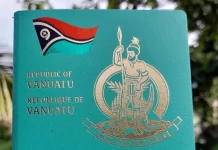Improving the region’s resilience to the potential impacts of climate change on the annual tuna income and livelihoods of millions of Pacific Islanders, was a key focus of the Inaugural Regional Meeting on Climate Change in the context of Tuna Fisheries.
In a Pacific-first, the meeting brought together Fisheries and Climate Change officials from Member countries to discuss the regional response to the impacts of climate change on Pacific offshore fisheries. It was a key step in the development of the Pacific Islands Forum Fisheries Agency’s (FFA) climate change strategy.
The strategy aims to support regional and national responses to climate change in the context of oceanic fisheries.
Speaking at the event, FFA’s Director General Dr Manu-Tupou-Roosen said: “..we’d like to draw your attention to the ‘not so visible’ slow onset impact of climate change to one of our critical sectors- the offshore fisheries sector.”
“The alarming warming trajectory poses a clear threat to the sustainable use and management of our valuable tuna resources. This is quite significant given that the Pacific is the only region where all four major tuna stocks are at sustainable levels.
At an international level. a third of the world’s supply of tuna is also from our Members’ waters.
At the national level, the contribution of our tuna fisheries to our Members’ economies is significant. In fact, they are so substantial that 10 out of 17 of our Member countries are ‘tuna dependent’.
Available data is indicating that most notably by 2050, climate change will impact both the distribution and abundance of our tunas and an anticipated reduction in government revenue of up to 20 percent.”
Current scientific evidence is indicating an eastward redistribution of tuna stock away from Pacific nation’s EEZ’s to the high seas. This is a major loss and damage issue due to the potential significant economic losses from climate change.
Discussions at the meeting were wide ranging but included:
*The importance of completing national maritime boundaries delineation processes;
*National and regional experiences of accessing climate finance from multilateral agencies such as the Green Climate Fund;
*Innovative climate financing instruments that are currently being adopted by other Pacific countries that leverage private sector finance;
*Prioritising gender and social inclusion as it disproportionately impacts vulnerable groups such as women and those living in poverty;
*Potential partnerships and opportunities for support from partners in the region including other CROP agencies.
The meeting held over three days was attended by representatives from Australia, Cook Islands, the Federated States of Micronesia, Fiji, Kiribati, Marshall Islands, Nauru, New Zealand, Niue, Palau, Papua New Guinea, Samoa, Solomon Islands, Tonga, Tokelau, and Tuvalu. Partners who also participated in the meeting include Pacific Community (SPC), Pacific Islands Forum Secretariat (PIFS), Secretariat of the Pacific Regional Environment Programme (SPREP), UNDP, Global Green Growth Institute (GGGI), Conservation International (CI), Matanataki Ltd, Asian Development Bank (ADB), and the Micronesia Conservation Trust (MCT).
SOURCE: FFA/PACNEWS















